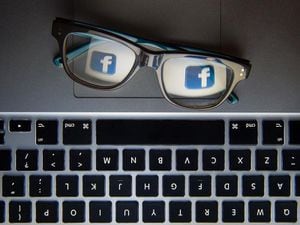Facebook: Just who is watching us?
Professor’s warning after personal data harvested by social media sites was used glean details of 50 million US citizens during election campaign.

It seems a bit of harmless fun. Answer a few questions about your favourite music or movies, what your favourite drink or meal is, and in return you get a witty, light-hearted assessment of your personality.
Your friends have all done it, and shared their results with you. Would be rude not to, wouldn’t it? Professor Mike Thelwall disagrees.

“I would never answer one of these surveys,” says the psychometrics expert from Wolverhampton University, who warns that even the most seemingly innocent questions can be used by data analysts to build up a frighteningly detailed profile of your personality, your interests, your economic circumstances and your political views.
“It might not be very good, the information might be wrong, but it will be right often enough to make it a marketable commodity,” he says.
The use of personal data harvested by social media sites is this week in the spotlight following claims data harvested from a personality test promoted on Facebook was used to glean the personal details of 50 million US citizens, in an attempt to influence the outcome of the 2016 presidential election.
And while you might think joking about your dubious taste in music or hedonistic lifestyle is a bit of harmless banter among friends, the reality is somebody somewhere may well be analysing your answers to sell on to a third party.
Say, for example, your first record was by The Beatles, your favourite film is Bridget Jones’ Diary, and you have a weakness for premium champagne? You’re probably a well-heeled female baby-boomer with discerning tastes. And if your best-ever holiday was a recent round-the-world cruise, you are probably retired (how else could you take six weeks out?) and likely to leave your house unattended for long periods, which is gold dust for the advertisers of, say, home security products or financial plans.
“It’s a big problem,” says Prof Thelwall. “Companies do keep a lot of data about us. The real problem is when they put together different data sets from various sources.
“For example, you might use the same email address for more than one service, enabling them to build a very detailed picture.
“They can now tell from the words they use whether somebody is male or female, they can tell what sort of job they do, how much money they have, whether they have children, they will look if you have expressed support for a political viewpoint.”
Most of this is perfectly above board. At the last General Election, the Conservatives, Labour and the Liberal Democrats all made extensive use of social media in their campaigning.
Sinister
Labour in particular – possibly explaining its better-than-expected electoral performance – cleverly using online surveys to assess the priorities and concerns of individual voters, and then target them with advertising material reflecting their views. Indeed, it could be argued tactics such as this are really just the hi-tech equivalent of the old-school doorstep canvassing, assuming, of course, those who took part in the surveys realised who they were talking to.
But the events of the past week have revealed a sinister new twist: the targeting of people who are merely friends of those who take part in the surveys. At the centre of the scandal was an innocent-looking quiz by Cambridge University psychologist Aleksandr Kogan.
The academic had developed a novelty phone app called thisisyourdigitallife, which predicted the personalities of people based on their Facebook profiles.
Only about 270,000 people took part in the survey, but Kogan’s app also allowed him to access the details of their Facebook “friends”, unless their privacy settings specifically prevented this.
It is estimated Kogan accessed 50m Facebook users – most of whom would be oblivious to what had happened. Kogan’s used the date to develop a model predicting personalities based on digital behaviour, which he supplied to British-owned data mining company Cambridge Analytica.
The company was employed by Donald Trump’s campaign team, a list of millions of people in the US, with their names, locations, sexes, ages and predicted test scores.
Apologised
There is no suggestion that President Trump was aware of the activities, but it may well have proved decisive in what was a very tightly fought campaign.
Facebook chief executive Mark Zuckerberg this week apologised for the data breach, and said the company had tightened its security procedures some time ago, which meant such actions would not be possible today.
“In 2014, to prevent abusive apps, we announced that we were changing the entire platform to dramatically limit the data apps could access,” he says.
“Most importantly, apps like Kogan’s could no longer ask for data about a person’s friends unless their friends had also authorised the app.
“We also required developers to get approval from us before they could request any sensitive data from people. These actions would prevent any app like Kogan’s from being able to access so much data today.”
It would be naive to think that Facebook is alone in harvesting customers’ data.
Prof Thelwall warns that every time you use the internet, you leave a footprint which could reveal personality traits which you might not realise you are sharing.
He says personal data is now a multi-billion pound business. Its value is perhaps highlighted by the success of websites such as Swagbucks, which offer small payments to subscribers who use its search engine or complete market research surveys.
Cautious
Supermarket loyalty cards are another example, with retailers carefully analysing our shopping habits in the pursuit of greater profits.
While the Cambridge Analytics scandal may in the short-term make people more cautious about sharing personal information, Prof Thelwall believes the data economy is here to stay.
“Facebook is very big, it would be hard to see that disappear,” he says.
His advice? “Be careful what you put online, because it will stay there for a very long time, and it can be used for things you don’t want.”





